Related Research Articles

Joseph Louis Barrow was an American professional boxer who competed from 1934 to 1951. Nicknamed "the Brown Bomber", Louis is widely regarded as one of the greatest and most influential boxers of all time. He reigned as the world heavyweight champion from 1937 until his temporary retirement in 1949. He was victorious in 25 consecutive title defenses, a record for all weight classes. Louis had the longest single reign as champion of any boxer in history.
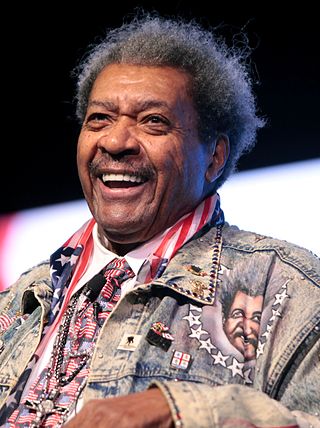
Donald King is an American boxing promoter, known for his involvement in several historic boxing matchups.

The Boston Garden was an arena in Boston, Massachusetts. Designed by boxing promoter Tex Rickard, who also built the third iteration of New York's Madison Square Garden, it opened on November 17, 1928, as "Boston Madison Square Garden" and outlived its original namesake by 30 years. It was above North Station, a train station which was originally a hub for the Boston and Maine Railroad and is now a hub for MBTA Commuter Rail and Amtrak trains.

The Chicago Stadium was an indoor arena in Chicago that opened in 1929, closed in 1994 and was demolished in 1995. It was the home of the National Hockey League's Chicago Blackhawks and the National Basketball Association's Chicago Bulls. It was used for numerous other sporting events, opening with a championship boxing match in March 1929. The Stadium was built by Paddy Harmon, a promoter, who sank his entire fortune into the project, only to lose control to the Stadium shareholders, and leave his family nearly penniless a year later when he died. After exiting receivership in 1935, the Stadium was owned by the Norris and Wirtz families until its closure in 1994.

George Lewis "Tex" Rickard was an American boxing promoter, founder of the New York Rangers of the National Hockey League (NHL), and builder of the third incarnation of Madison Square Garden in New York City. During the 1920s, Tex Rickard was the leading promoter of the day, and he has been compared to P. T. Barnum and Don King. Sports journalist Frank Deford has written that Rickard "first recognized the potential of the star system." Rickard also operated several saloons, hotels, and casinos, all named Northern and located in Alaska, Nevada, and Canada.

Benny Leonard was an American professional boxer who held the world lightweight championship for eight years, from 1917 to 1925. Widely considered one of the all-time greats, he was ranked 8th on The Ring magazine's list of the "80 Best Fighters of the Last 80 Years" and placed 7th in ESPN's "50 Greatest Boxers of All-Time". In 2005, the International Boxing Research Organization ranked Leonard as the #1 lightweight, and #8 best pound-for-pound fighter of all time. Statistical website BoxRec rates Leonard as the 2nd best lightweight ever, while The Ring magazine founder Nat Fleischer placed him at #2. Boxing historian Bert Sugar placed him 6th in his Top 100 Fighters catalogue.

Christopher Battaglia better known as Battling Battalino, was an American World Featherweight boxing champion. Born in Hartford, Connecticut, Battalino engaged in 88 bouts during his career, of which he won 57, lost 26, and drew 3. He was managed by Hy Malley and Lenny Marello. He was inducted into the International Boxing Hall of Fame in 2003.

Vince Dundee, born Vincenzo Lazzara in Sicily, became the New York State Athletic Commission world middleweight champion when he defeated reigning champion Lou Brouillard on October 30, 1933. His title was also recognized by the National Boxing Association (NBA). He was the younger brother of former welterweight world champion of boxing, Joe Dundee.

Danno O'Mahony was an Irish professional wrestler who enjoyed a brief but meteoric rise to massive popularity in the mid-1930s following a successful introduction to the Boston regional wrestling scene. His surname was usually spelt "O'Mahoney" during his wrestling career. His signature move was the Irish Whip, which acquired its name due to its association with O'Mahony. O'Mahony would find success as a wrestler becoming the National Wrestling Association's World Heavyweight Champion. Professional Wrestling journalist and historian Dave Meltzer has referred to O'Mahony as "the first true ethnic super-draw" in American professional wrestling.

Robert Lous Olin was an American boxer who became the World Light Heavyweight champion on November 16, 1934, against Maxie Rosenbloom at Madison Square Garden. He was trained by Ray Arcel and managed by Harold Scadron.
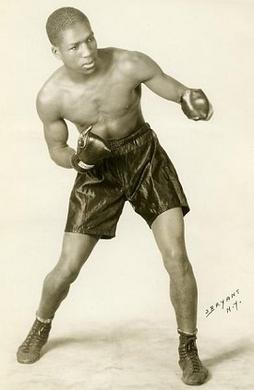
William Landon Jones (1906–1982) known as "Gorilla" Jones, was an American boxer who held the NBA Middleweight Boxing Championship of the World. Although he was nicknamed "Gorilla" for his exceptional reach, Jones is to be distinguished from the original "Gorilla Jones", who campaigned from 1913 to 1924 and held the World Colored Welterweight title. Jones was never knocked out. He had 52 knockouts out of his 101 wins, with over 141 total fights. He was posthumously inducted into World Boxing Hall of Fame in 1994 and the International Boxing Hall of Fame in 2009.

John J. Jadick, better known as Johnny Jadick was an American light welterweight boxer and the NBA light welterweight world champion in 1932. In September 1932, the NBA decided not to recognize junior divisions. Jadick continued to reign as the world light welterweight champion until February 1933 when he was defeated by Battling Shaw for the championship which had been continually recognized by the Louisiana State boxing commission. He was born and raised in Philadelphia, Pennsylvania. Though not an exceptionally strong puncher, he had great speed, and an effective left jab. He was managed by Tommy White, and trained by Joe Ferguson.
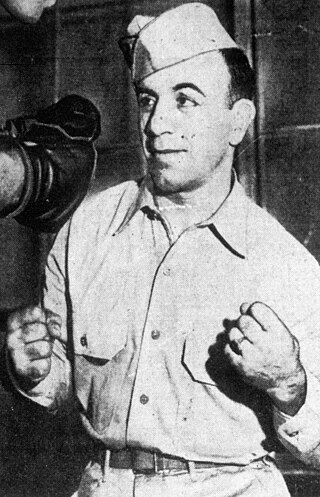
Petey Sarron was an Assyrian-American boxer who became a National Boxing Association (NBA) Featherweight Champion on May 11, 1936, defeating Freddie Miller at Griffith Stadium in Washington, D.C. He was inducted into the International Boxing Hall of Fame in 2016.

Tommy Paul was a world featherweight boxing champion from Buffalo, New York. He won the world featherweight championship in May 1932, defeating Johnny Pena in a boxing tournament in Detroit. He was inducted into the first class of Buffalo’s Ring No. 44 Boxing Hall of Fame and in 2003 to the Greater Buffalo Sports Hall of Fame. He retired from the ring in 1935.

Michael Strauss Jacobs was a boxing promoter, arguably the most powerful in the sport from the mid-1930s until his effective retirement in 1946. He was posthumously elected to the World Boxing Hall of Fame in 1982, and the International Boxing Hall of Fame in 1990.
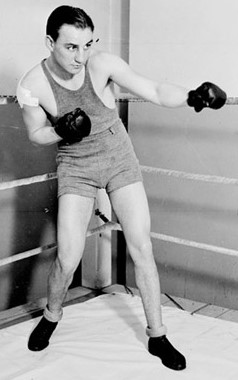
Jackie Fields was an American professional boxer who won the World Welterweight Championship twice. Statistical boxing website BoxRec lists Fields as the #19 ranked welterweight of all-time. Fields was elected to the United Savings-Helms Hall of Boxing Fame in 1972, the International Jewish Sports Hall of Fame in 1979, the World Boxing Hall of Fame in 1987, and the International Boxing Hall of Fame in 2004.
The Marine Gardens was an entertainment complex located in the Portobello area of Edinburgh, Scotland. Opened in 1909 as a pleasure garden and amusement park on the shores of the Firth of Forth, most of its original attractions apart from the ballroom were removed following military use of the site during the First World War. The complex also included a stadium which was used during the interwar period for football, greyhound racing and speedway. It was the home venue of Scottish Football League teams Leith Athletic (1928–1936) and Edinburgh City. The Marine Gardens closed down permanently in 1939 after again being taken over by the military, with the area being redeveloped after the Second World War.
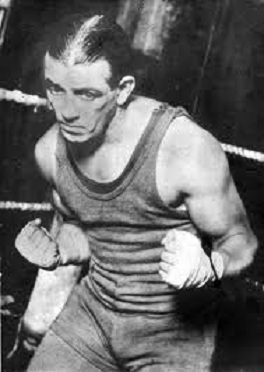
Harry Mason was a British boxer who was a British and European (EBU) champion in the lightweight division and British champion in the welterweight division.

Johnny Cuthbert was a British boxer who was British featherweight champion between 1927 and 1928, and again from 1929 to 1931, winning the Lonsdale Belt outright, and British lightweight champion between 1932 and 1934.

The Grand Circuit, also known as the "Big Wheel", is a group of harness racing stakes races run at various race tracks around the United States. Run on one-mile tracks, it is "the oldest continuing horse-racing series in the United States."
References
- ↑ "Boston Garden Shows Big Profit". Painesville Telegraph. May 11, 1932. Retrieved 25 January 2024.
- 1 2 3 4 5 Dunkley, Charles W. (February 3, 1929). "Detroit Promoter Protege Rickard". Lundington Daily News. Retrieved 25 January 2024.
- ↑ Lawrence, Seabury (September 20, 1926). "Stadium Builders Busy All Sunday". The New York Times.
- ↑ "Schmeling-Stribling Bout Given to Dunn". The Boston Globe. April 14, 1931.
- ↑ Dawson, James P. (August 13, 1928). "Risko Now Sought For Delaney Bout". The New York Times.
- ↑ "Dunn, Detroit Promoter, Signed By Boston Garden". Meriden Record. January 14, 1931. Retrieved 25 January 2024.
- ↑ "Aimee's Revival Here Oct 10 to 18". The Boston Globe. September 23, 1931.
- ↑ Egan, David (October 24, 1931). "Lou Brouillard New Champion". The Boston Globe.
- ↑ F.H.D. (November 12, 1931). ""In Our Opinion"". The Telegraph. Retrieved 25 January 2024.
- ↑ "Werrenrath Coming To Boston Garden". The Telegraph. November 30, 1931. Retrieved 25 January 2024.
- ↑ "New England Fair to be Staged at Rockingham". The Boston Globe. December 20, 1931.
- ↑ "Rockingham Should Hum Very Soon". Lewiston Evening Journal. June 8, 1932. Retrieved 25 January 2024.
- ↑ "Announce Return of Grand Circuit to N.E. This Year". The Lewiston Daily Sun. January 15, 1932. Retrieved 25 January 2024.
- ↑ F. H. D. (December 2, 1931). ""In Our Opinion"". The Telegraph. Retrieved 25 January 2024.
- ↑ "Dunn Quits Post at Boston Garden". The Boston Globe. August 3, 1932.
- ↑ "Two 50-Mile Races at Readville Today". The Boston Globe. September 5, 1932.
- ↑ "First Auto Meet At Elsmere Soon". The Sunday Morning Star. May 28, 1933. Retrieved 25 January 2024.
- ↑ "Auto Racing". The Meriden Daily Journal. August 17, 1934. Retrieved 25 January 2024.
- ↑ "Star Auto Drivers to Race". The New York Times. July 24, 1935.
- ↑ "Dick Dunn Consultant At Amherst". The Telegraph. June 6, 1940. Retrieved 25 January 2024.
- ↑ "Gus Sonnenberg In Feature Bout". The Border Cities Star. November 3, 1932. Retrieved 25 January 2024.
- ↑ "Don George to Top Mat Card". The Border Cities Star. November 24, 1932. Retrieved 25 January 2024.
- ↑ "Dick Shikat Tops Program". The Border Cities Star. January 12, 1933. Retrieved 25 January 2024.
- ↑ "Szabo, Zbyszko Top Mat Card". The Border Cities Star. January 19, 1933. Retrieved 25 January 2024.
- ↑ "Bostonians Form Fight Syndicate". The Border Cities Star. February 7, 1934. Retrieved 25 January 2024.
- ↑ "New Boston Fight Club Treasurer is Mrs. Jessie Costello". The Lewiston Daily Sun. March 15, 1934. Retrieved 24 January 2024.
- ↑ Hurwitz, Hy (April 3, 1934). "From Pillar to Post". The Boston Globe.
- ↑ Hurwitz, Hy (May 24, 1934). "Garden to Drop Out of Boxing". The Boston Globe.